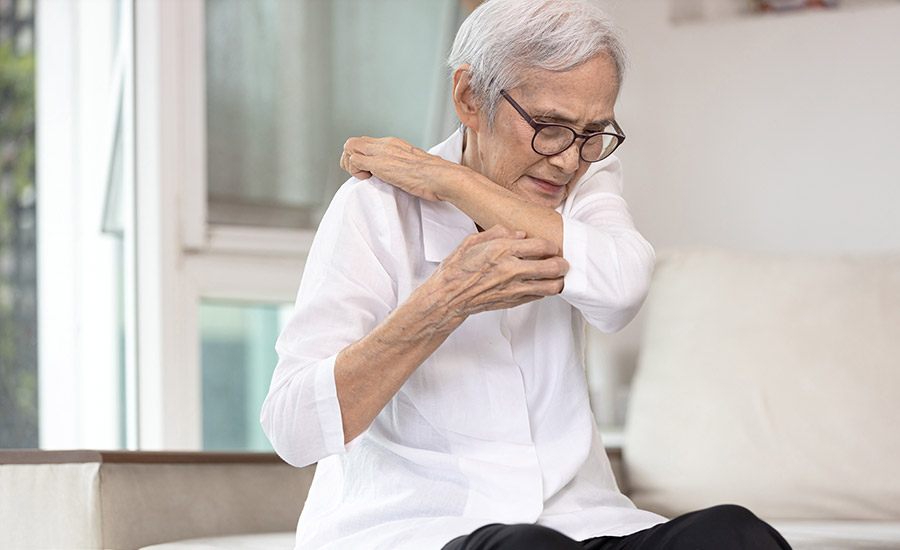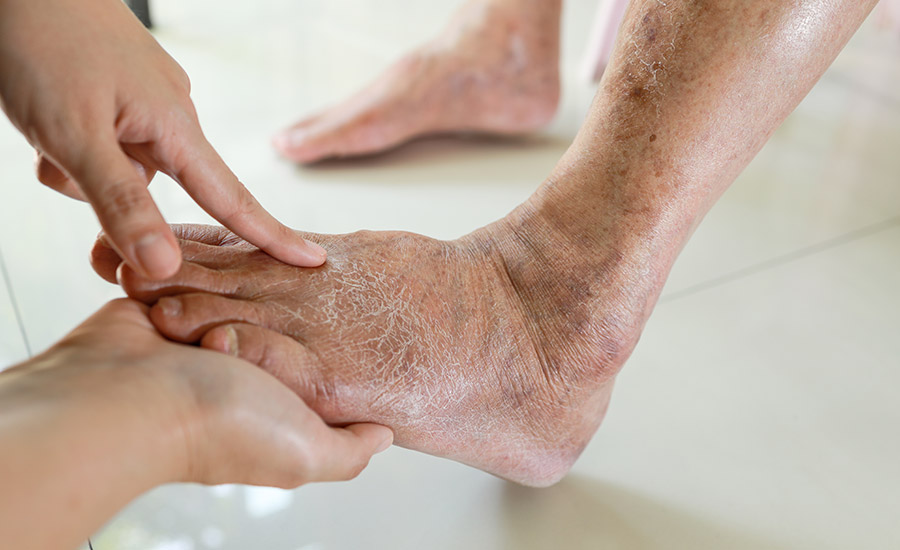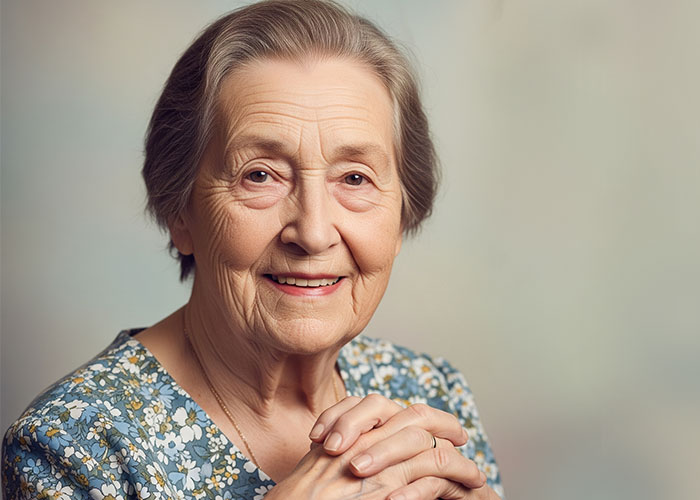Understanding Xeroderma + How To Manage Aging Dry Skin

Xeroderma, also known as dry skin, is a condition caused by a decrease in the skin’s ability to retain moisture. It is often influenced by environmental factors, aging, certain medications, or underlying health issues.
If you’re caring for a loved one with xeroderma, it’s important to understand that this condition requires gentle skin care and adequate moisturizing.
We’ll cover everything you need to know about xeroderma as a caregiver, including causes, symptoms, and skin care management, so you can help your loved one maintain healthier and more comfortable skin.
Table of Contents
What Is Xeroderma?
Xeroderma is a skin condition characterized by skin dryness, roughness, flaking, and scaling.
This condition can cause pruritus or itchy skin, which can lead to skin picking and an increased risk of skin infections, such as cellulitis, impetigo, or folliculitis.
What Causes Xeroderma in the Elderly?
Xeroderma is influenced by inherent changes in the skin and lifestyle choices, such as the type of hygiene products you use.
This skin condition is often caused by a combination of factors, including:
- Reduction of lipids in the stratum corneum (outermost layer of the skin): With age, the production of lipids or fatty compounds is reduced. This decrease can lead to a weakened skin barrier.
- Altered skin composition: As the skin ages, the balance of ceramides, cholesterol, and free fatty acids — waxy molecules that maintain skin hydration — can be altered since the natural lipid production decreases.
- Changes in skin proteins: The activation of involucrin — a key protein in the skin — can increase the stiffness of skin cells, affecting its overall texture and flexibility.
- Impaired skin cell turnover: As a result of these skin changes, there is often a retention of corneocytes or the outermost skin cells. This retention — combined with the skin’s reduced ability to hold water — can lead to the dry or rough texture of the skin.
- Medication side effects: Diuretics, statins, and topical acne medication can contribute to skin dryness, as they can interfere with the body’s natural oil production. For example, diuretics can increase urine output, which can lead to dehydration. On the other hand, statins can affect the skin’s lipid barrier or natural fats.
- Underlying health conditions: Conditions such as diabetes or kidney disorders can affect skin hydration and texture, as they can alter the body’s circulation, nutrient supply, and fluid balance.
- Lifestyle choices: Dehydration and poor nutrition can aggravate skin dryness, as they deprive the skin of essential nutrients and hydration needed to maintain its health and elasticity.
- Hygiene products: Hygiene products, such as body lotions that contain fragrances and harsh soaps that contain sulfates, can strip the skin of its natural oils and compromise the skin’s barrier function.
- Stress: Stress can have a significant impact on the skin, as it can disrupt the skin’s barrier function and increase inflammation.
Xeroderma Symptoms
With age, skin can display signs of dryness — especially in areas like the hands, feet, and face.
Symptoms of xeroderma in the elderly include:
- Cracked skin, which can range from minor fissures to deeper, painful cracks
- Rough texture, in which the skin may feel coarse to the touch
- Tightness, in which the skin may feel constricted, particularly after bathing
- Flaking and scaling, characterized by peeling or flaky patches
- Discoloration, in which skin appears lighter or darker than usual, and is accompanied by red or purple spots

How To Care for an Elderly Loved One With Xeroderma
If you’re caring for an elderly loved one with this skin condition, encourage your loved one to:
- Identify dry skin: Early detection of the condition allows for timely intervention of underlying health conditions that can cause skin dryness (like diabetes). These steps can mitigate symptoms and improve the quality of skin health.
- Use a humidifier: Place a humidifier in the room to moisten the air — especially in dry environments with air conditioning or heating.
- Wear loose clothes: Choose clothing that is loose and made from soft, breathable fabrics like cotton. Tight clothing can irritate dry skin and exacerbate xeroderma.
- Limit sun exposure: Avoid sun exposure from 10 a.m. to 4 p.m. when UV rays are most harmful.
- Drink enough water: Drink around six to eight glasses of water to stay hydrated.
- Get enough sleep: Aim for seven to nine hours of sleep per night to support skin regeneration and collagen production.
- Eat a nutritious diet: Eat a diet rich in vitamins and healthy fats to support optimal skin health by incorporating fatty fish, fruits, and vegetables into your meals.
- Limit or avoid spicy foods: Spicy foods can cause itching or skin irritation, as they contain acidic lycopenes.
- Adjust bathing habits: Keep baths or showers short and limit them to between five to 10 minutes.
- Use lukewarm water: Use lukewarm water during bath time to help prevent dryness, as it preserves the natural oils from the skin.
- Use fragrance-free and sulfate-free hygiene products: Choose gentle, fragrance-free cleansers and soaps to help maintain skin oils.
- Avoid irritants: Carefully choose skin care products that are free from ingredients that might irritate the skin, such as parabens. These ingredients can cause allergic reactions or contact dermatitis — a skin condition that is characterized by redness, itching, and sometimes a rash.
- Protect their skin: Safeguard their skin by seeking shade, wearing protective clothing, and using sunscreen with an SPF of 30 or higher.
- Apply a rich moisturizer: Use a moisturizer that contains ingredients such as glycerin, hyaluronic acid, and ceramides to help lock in moisture. Regularly moisturize throughout the day, particularly after handwashing or contact with water.
- Practice stress-reducing techniques: Engage in activities that can help reduce stress, such as yoga, meditation, and deep breathing exercises, which in turn can improve skin health.
- Visit their dermatologist: Schedule annual appointments with a dermatologist for skin evaluations and better care.

Find Reliable Senior Care at Always Best Care
At Always Best Care Senior Services, we offer premier health care services tailored for seniors, focusing on personal care, dietary supervision, and pain management.
Our thoroughly vetted and experienced caregivers have successfully helped thousands of seniors and their families, to relieve the burden of family caregiving and provide compassionate, personalized care.
Our services include:
- In-home care: We offer 24-hour care, companionship, nutrition monitoring and medication reminders, along with bathing, grooming, and dressing services.
- Skilled home health care: Available in select locations, we offer tailored care plans for long-term conditions, including diabetic care and chronic illness management. Our team of certified nurses, therapists, and home health aides is committed to providing extensive and convenient care plans.
- Specialized home care: We offer daily social engagement and healthcare insights right from the comfort of your loved one’s home. Thanks to advanced technology, such as personal emergency response systems, remote patient monitoring, and balance tracking, we can effectively manage symptoms and conditions.
- Respite care: We provide flexible support, from a few hours at a time to extended care, giving you a much-needed break from caregiving responsibilities.
- Senior living referral: We help you find the ideal senior living community for your loved one by aligning their unique needs and location preferences with the best senior living communities.
- Veterans assistance program: We help veterans secure financial aid for medical care. This is our way of thanking them for their service.
At Always Best Care Senior Services, our dedicated team is committed to delivering the highest level of care and support for our patients.
To learn more about our services and the care we provide, contact us to set up a consultation.
FAQs About Xeroderma in the Elderly
Looking for more information about xeroderma? Explore some frequently asked questions about the skin condition below.
Is xeroderma painful?
Xeroderma is not usually painful. However, if the condition becomes severe and the skin gets excessively dry, it can lead to cracking and itching, which can be uncomfortable or even painful. In extreme cases, deep cracks can bleed.
Is there a cure for xeroderma?
Yes, there is a cure for dry skin. While many individuals can experience life-long dry skin, you can manage your condition by keeping your skin moist.
Consult with your doctor for personalized advice and to check for any underlying conditions that might be exacerbating the dryness.
In addition, regularly apply moisturizers — at least twice a day — to keep your skin hydrated.
What are the complications of xeroderma if left untreated?
If left untreated, xeroderma can lead to several complications, including:
- Cracked skin
- Infections, such as cellulitis or large skin abscesses
- Eczema, which is characterized by red, itchy, and inflamed skin.
- Severe itching
Is over-moisturizing harmful?
Yes, over-moisturizing can be harmful to the skin, as it can lead to clogged pores and even disrupt the skin’s natural balance of oils and moisture.
In addition, excessive moisturizing can cause the skin to become dependent on external hydration, reducing its ability to self-regulate and maintain its own natural moisture levels.




![10 Senior Living Technologies You Should Know About [+ FAQs]](https://alwaysbestcare.com/wp-content/uploads/2025/06/senior-living-technology-hero-image.jpg)
